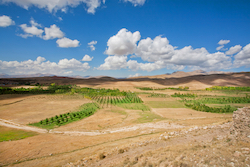Geopolitics and food security – control and power
The RUDEFOPOS-IRAQ project assessed the role of food security and rural development in the politics of current and former regimes in Iraq. The project was interested in the degree to which prevalent networks of patronage and rent, along with violent conflict, impacted on the country’s internal relations. “By analysing satellite imagery, grey material, leaked ISIS documents and newspaper sources, we were able to show that agriculture played an important role in funding the terror group,” says Dr. Eckart Woertz, Senior Research Fellow, based at the Centre for International Information and Documentation in Barcelona, Spain. Gaining valuable insight into just what part patronage and rent distribution play in regional stability and governance was challenging on many levels – not least the inaccessibility of ISIS controlled territory. The project employed a two-pronged approach, analysing historical documents and getting a clear picture of the current situation through the use of the internet, satellite images and a field trip to the Kurdistan Region of Iraq (KRI). Access to historical documents brought its own challenges. Over 11 million records are lodged at the Hoover Institution at Stanford University, brought to the US in the wake of its 2003 occupation of Iraq. Along with the difficulty of selecting what to analyse amongst such a large volume of material, the project also had to deal with time pressures. Records of the Iraqi government and Saddam Hussein’s presidential diwan were housed at the National Defence University in Washington. This closed down in 2015 and with his project well under way at the time, Dr. Woertz had to get his analysis done before the doors were locked. To understand what the situation is now, Dr. Woertz relied on an online survey among Iraqi academics from all over Iraq and on expert interviews that he conducted during a field trip to the KRI. The shaky security system made it impossible to conduct household interviews elsewhere, but, says Dr. Woertz, “I was also able to rely on earlier extensive quantitative surveys of the World Food Programme (WFP), the World Bank and the International Labour Organization (ILO).” Working with Hadi Jaafar of the American University of Beirut, he used satellite images to overcome the inaccessibility of ISIS-held territory. This enabled them to show how agricultural production under ISIS had developed in 2014-15. “All the work showed that food security and agriculture play a major role in the politics of Iraq, past, present and future. During the multilateral UN embargo of 1990-2003, the role of food security and agriculture was paramount in the strategic calculus of Saddam Hussein’s regime.” More contemporaneously, the project revealed the importance of agriculture as a funding source of ISIS, after it had conquered vast tracts of the two bread-baskets of Syria and Iraq, specifically the Gezira and Nineveh provinces. “Our work on agriculture as a funding source of ISIS broke new ground and has relevance beyond the existence of the group as a wannabe proto state, which now has come to an end.” When it comes to contemporary Iraqi food security challenges, qualitative and quantitative surveys indicate that the population overwhelming identifies political issues as the main concern. “Technocratic approaches alone (e.g. improving irrigation or designing nutrition interventions) will not suffice,” Dr. Woertz explains. “I think it would be good if food security issues gained greater priority in European development, security and foreign policies in the Middle East. Whether it is Syrian reconstruction or political stability in Iraq, food security and agriculture will have a major role to play. I hope that RUDEFOPOS-IRAQ has been able to raise some awareness in this regard,” he concludes.
Keywords
RUDEFOPOS-IRAQ, food security, geopolitics, Iraq, governance, agricultures, Syria, internal relations



